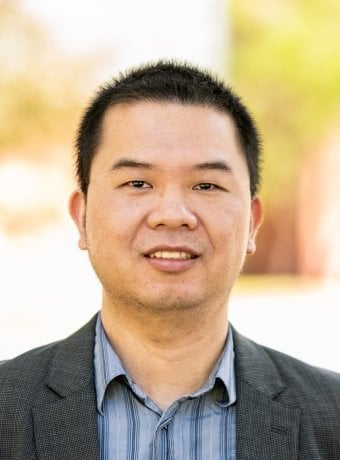Online Education for Working Professionals
Develop a foundation of analytical mechanics and multiphysics modeling.

Use individual and team exercises to build skills for a dynamic systems approach.
Engineered systems increasingly must exploit complex interactions between multiple
domains—mechanical, electrical, chemical and biological. Numerical model prediction
is a powerful tool for optimal design, vibration analysis, test plan development,
and control system design. Through a combination of theory and practice, this certificate
helps engineers model, analyze, and control multiphysics dynamic systems using MATLAB
Simulink and Simscape.
Request Info
How to Apply
3 courses in 3 semesters.
| Length |
3 courses in 2-3 semesters |
| Effort |
3 hours per credit per week |
| Each course |
3 credits |
| Total credits |
9 |
| Course type |
Online or on-campus |
| Modality |
Watch class recordings on demand |
| Cost |
Based on credits and course type |
| Already enrolled? |
Speak with your advisor |
Curriculum
Progress quickly with a compact curriculum. Work with the program advisor to select
courses that fit your interests and pre-requisite skills.
Prerequisites
Check your preparation. Here are some of the pre-requisite courses for this certificate.
EE 3261 - Control Systems
Mathematical formulation of control problems (both transfer function and state-variable descriptions); analysis of feedback control systems (stability, transient performance, steady-state error, sensitivity, etc.); analog and digital simulation; and experiments with physical systems.
- Credits:
3.0
- Lec-Rec-Lab: (2-0-2)
- Semesters Offered:
Fall, Spring
- Pre-Requisite(s): EE 3160
ME 3400 - Machine Design and Analysis
In this course, students apply concepts from previous classes to design and analyze mechanical systems using solid elements, bolted joints, welds, springs, spinning shafts, bearings, and gears. Students use case studies to develop relationships between design and performance.
- Credits:
3.0
- Lec-Rec-Lab: (0-3-0)
- Semesters Offered:
Fall, Spring, Summer
- Restrictions:
Must be enrolled in one of the following Major(s): Robotics Engineering, Mechanical Engineering
- Pre-Requisite(s): MSE 2100 and (ENG 2120 or MEEM 2150 or ME 2150) and (MEEM 2700 or ME 2700)
ME 3750 - Dynamic Systems
This course deals with the modeling, analysis and control of mixed physics systems. It covers differential equation generation for mechanical, thermal, and electrical systems, their simulation, and methods for analyzing their performance operating in both open and closed loop.
- Credits:
4.0
- Lec-Rec-Lab: (0-4-0)
- Semesters Offered:
Fall, Spring, Summer
- Restrictions:
Must be enrolled in one of the following Major(s): Mechanical Engineering, Mechatronics, Aerospace Engineering
- Pre-Requisite(s): (MEEM 2700 or ME 2700) and (MA 3520 or MA 3521 or MA 3530 or MA 3560)
Required Courses
Take 6 credits of required courses. Take ME 5730 Dynamic System Simulation if it is
offered, or take ME 5990 as Special Topics: Dynamic System Simulation.
ME 5701 - Engineering Vibrations
Intermediate study of several topics in engineering dynamics, including three-dimensional kinematics and kinetics, generalized coordinates, Lagrange's equation, and Hamilton's principle. Uses computer-aided dynamic simulation tools for analyzing dynamic systems.
- Credits:
3.0
- Lec-Rec-Lab: (0-3-0)
- Semesters Offered:
Fall
- Restrictions:
Must be enrolled in one of the following Major(s): Mechanical Eng-Eng Mechanics, Mechanical Engineering
- Pre-Requisite(s): MEEM 4901(C) or ME 4901(C) or ENT 4950(C) or Graduate Status >= 1
ME 5730 - Dynamic System Simulation
Methods for simulating dynamic systems described by ordinary differential equations using numerical integration are developed including error quantification and simulation verification. MATLAB, Simulink and Simscape are used to illustrate key concepts.
- Credits:
3.0
- Lec-Rec-Lab: (0-3-0)
- Semesters Offered:
Spring
- Restrictions:
Must be enrolled in one of the following Level(s): Graduate;
Must be enrolled in one of the following Major(s): Mechanical Engineering, Mechanical Eng-Eng Mechanics, Vehicle Dynamics
Study of selected subjects related to mechanical engineering or engineering mechanics.
- Credits:
variable to 4.0;
May be repeated
- Semesters Offered:
Fall, Spring, Summer
- Restrictions:
Permission of department required;
Must be enrolled in one of the following Level(s): Graduate
Electives
Take a 3-credit elective course.
ME 4450 - Vehicle Dynamics
This course will develop the models and techniques needed to predict the performance of a road vehicle during drive off, braking, ride, and steering maneuvers. Topics to be covered include: acceleration and braking performance, power train architecture, vehicle handling, suspension modeling, tire models, and steering control. Matlab, Adams Car, and Amesim, will be used as computational tools.
- Credits:
3.0
- Lec-Rec-Lab: (0-3-0)
- Semesters Offered:
Spring
- Restrictions:
Must be enrolled in one of the following College(s): College of Engineering;
Must be enrolled in one of the following Class(es): Junior, Senior
- Pre-Requisite(s): MEEM 3400 or ME 3400 or EE 3261
ME 4775 - Analysis & Design of Feedback Control Systems
This course covers topics of control systems design. Course includes a review for modeling of dynamical systems, stability, and root locus design. Also covers control systems design in the frequency domain, fundamentals of digital control and nonlinear systems.
- Credits:
4.0
- Lec-Rec-Lab: (0-3-2)
- Semesters Offered:
Fall
- Restrictions:
Must be enrolled in one of the following Major(s): Mechanical Eng-Eng Mechanics, Mechatronics, Mechanical Engineering, Robotics Engineering
- Pre-Requisite(s): MEEM 3750 or EE 3160 or ME 3750
ME 5702 - Engineering Vibrations
First in a series of two courses on vibro-acoustics to provide a unified approach to study noise and vibration. Emphasizes interaction between sound waves and structures. Presents advanced vibration concepts with computational tools. Discusses wave-modal duality.
- Credits:
3.0
- Lec-Rec-Lab: (0-3-0)
- Semesters Offered:
Spring
- Restrictions:
Must be enrolled in one of the following Major(s): Mechanical Eng-Eng Mechanics, Mechanical Engineering
- Pre-Requisite(s): ME 4702(C) or Graduate Status >= 1
ME 5715 - Linear Systems Theory and Design
Overview of linear algebra, modern control; state-based design of linear systems, observability, controllability, pole placement, observer design, stability theory of linear time-varying systems, Lyapunov stability, optimal control, linear quadratic regulator, Kalman filter,
- Credits:
3.0
- Lec-Rec-Lab: (0-3-0)
- Semesters Offered:
Fall
- Restrictions:
Must be enrolled in one of the following Level(s): Graduate;
Must be enrolled in one of the following Major(s): Mechanical Eng-Eng Mechanics, Mechanical Engineering
- Pre-Requisite(s): MEEM 3750 or ME 3750 or EE 3261
EE 5715 - Linear Systems Theory and Design
Overview of linear algebra, Modern Control: state-space based design of linear systems, observability, controllability, pole placement, observer design, stability theory of linear time-varying systems, Lyapunov stability, optimal control, Linear Quadratic regulator, Kalman filter, Introduction to robust control.
- Credits:
3.0
- Lec-Rec-Lab: (0-3-0)
- Semesters Offered:
Fall
- Restrictions:
Must be enrolled in one of the following Level(s): Graduate;
Must be enrolled in one of the following Major(s): Electrical Engineering, Electrical & Computer Engineer
- Pre-Requisite(s): EE 3261 or MEEM 3750 or ME 3750
Typical Schedule
The minimum completion time is two semesters. Here is a typical schedule.
| Fall |
Spring |
ME 5701
ME 4775 |
ME 5730 |
Application Process and Admissions Requirements
Applications are reviewed on an individual basis using a holistic approach. Fill out
our free graduate application online to apply to any of our programs. Official transcripts and scores are not required
for the initial application, although you will need to upload them later.
Graduate School Admissions Process
Applying to the Graduate School is free (no application fees) and fast (no official transcripts, test scores, or letters needed to start). The application
process involves three easy steps.
See Admissions Steps
Graduate School Requirements
To be considered for admission to the Graduate School as a degree- or certificate-seeking student, you need to:
- have a bachelor's degree or its equivalent from an accredited institution, and
- be prepared for advanced study in your chosen field, as demonstrated by your previous
degree and your scholastic record.
See additional application requirements, including required materials:
Program Specific Requirements
Program Specific
- Admitted applicants typically have an undergraduate GPA of 3.0 or better on a 4.0
scale
- GMAT/GRE: Not required
- Preferred major: Mechanical Engineering or closely related technical field - Students
with degrees in other fields may be required to take preparatory courses
International Students
- TOEFL: Recommended Score of 79 iBT
- IELTS: Recommended Overall Band Score of 6.5
Admissions Decisions
Made on a rolling basis.
Prospective Students
- Prospective students and non-degree seeking students interested in obtaining a graduate
certificate must apply to the certificate program using the online application.
- Accelerated certificate options exist for current Michigan Tech undergraduate students in good standing and have
achieved at least junior-level standing or recent bachelor’s graduates of Michigan
Tech (less than two years).
- The number of credits earned prior to admission that can be counted are restricted.
Current Graduate Students
- Current Michigan Tech graduate students who are in a degree program do not need to formally apply. Current students must still submit the appropriate degree schedule in order to complete the certificate.
International Student Requirements
International Students must apply and be accepted into a degree-granting program in order to earn a graduate certificate. A non-refundable $10 processing fee per application is required.
See International Applicants
Interested in taking a single, online course? Enroll as a non-degree seeking student.
Upon completion of the Certificate the student should be able to:
- Develop differential equation models of multiphysics dynamic systems exploiting methods
from analytical mechanics
- Create simulations of dynamic systems to achieve specified accuracy requirements using
advanced MATLAB, Simulink, and Simscape techniques
- Develop and select integration schemes for both real-time (embedded) and batch simulations
- Design advanced control systems or conduct vibration analysis studies for complex
dynamic systems
- Communicate the dynamic system analysis process through written project reports including:
statement of assumptions, equation of motion derivation, listing of conserved quantities,
numerical model architecture justification, and steps taken to verify numerical results
Michigan Tech was founded in 1885.
The University is accredited by the Higher Learning Commission and widely respected
by fast-paced industries, including automotive development, infrastructure, manufacturing,
and aerospace. Michigan Tech graduates deliver on rapid innovation and front-line
research, leaning into any challenge with confidence.
The College of Engineering fosters excellence in education and research.
We set out as the Michigan Mining School in 1885 to train mining engineers to better
operate copper mines. Today, more than 60 percent of Michigan Tech students are enrolled
in our 17 undergraduate and 29 graduate engineering programs across nine departments.
Our students and curriculum embrace the spirit of hard work and fortitude our founders
once had. Our online graduate courses are the same, robust classes taken by our doctorate
and masters candidates, taught directly by highly regarded faculty, with outstanding
support from staff. We invite working professionals to join these courses, bring their
own experience and challenges as part of the discussion. Leverage the national reputation
of Michigan Tech to advance your career in tech leadership.
Online Certified Instructors
Meet the online certified instructors. Students have the flexibility to review class
recordings later.

Teaching Statement
Dr. Blough teaches classroom and industry short course topics on dynamic measurement, signal analysis, and other experimental noise, vibration, and harshness techniques.
View Profile

Teaching Statement
Dr. Ma teaches courses in mechanical system design and analysis, advanced CAD and CAM methods, mechanism synthesis, dynamic modeling, and vehicle dynamics.
View Profile

Teaching Statement
Dr. Parker teaches courses in dynamic systems, control, robotics, and mechatronics, as well as linear and nonlinear system theory.
View Profile

Teaching Statement
Dr. Weaver teaches on propulsion systems for hybrid electric vehicles and linear systems theory and design.
View Profile

Teaching Statement
Dr. Yang teaches on topics of statics, shock, and vibration.
View Profile





